Spelling Bee winners put Prime Minister Albanese to the test
It has become a tradition for the PM Spelling Bee winners to give the Prime Minister a little spelling test of his own, but there was one especially tricky word that Mr Albanese chose to pass on
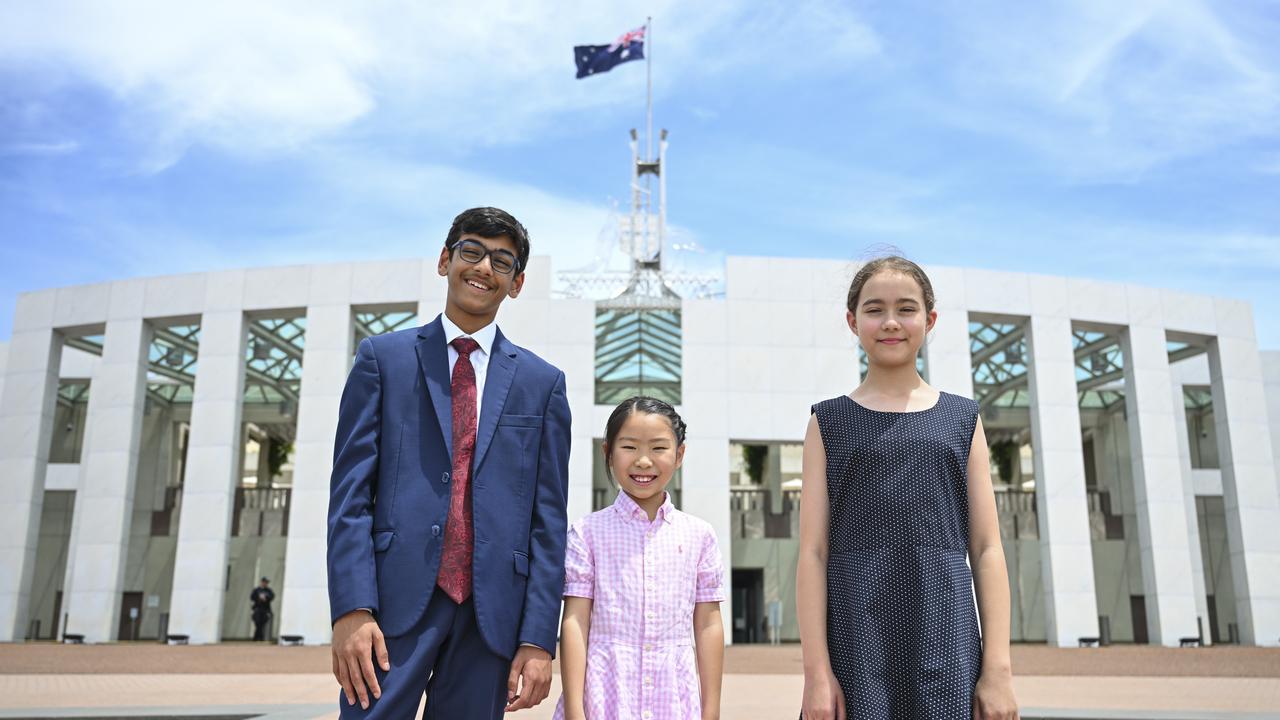
READING LEVEL: GREEN
Anthony Albanese has wisely ducked a challenge given by one of Australia’s top young spellers. The Prime Minister chose to pass when asked to spell the scientific name of one of Australia’s most iconic* animals: The Platypus.
The dare was given by 11-year-old Queensland student Jillian Strong, who along with fellow 2024 Prime Minister’s Spelling Bee winners, Aditya Paul, 13 (Sydney), and Echo Feng, 9 (Canberra), claimed the top prize of meeting Mr Albanese on Monday.
Asked to spell “ornithorhynchus anatinus,” the Prime Minister instead phoned a friend, passing on the challenge to Aditya, who spelled it confidently.
“No, I’m not doing that, you can ask him,” Mr Albanese said, prompting laughter from the students and their parents.
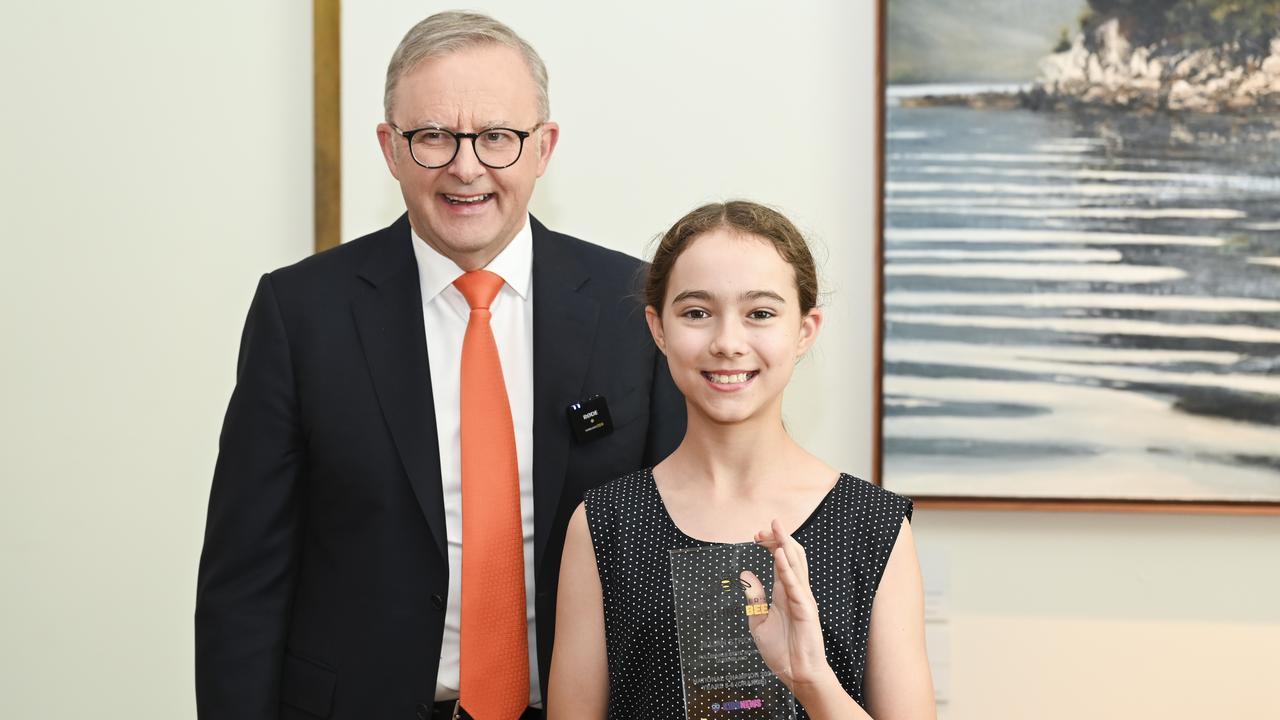
Sure that Mr Albanese had shirked* her word, Jillian joked it made her “a little irritated”.
Mr Albanese’s performance was an improvement on last year’s effort, where he failed to spell “Caesar”, “balalaika”, the word for a Russian stringed instrument, and “ethnomusicological”, the study of music.
This time around, the Prime Minister spelled the word “astrophysicist*,” as chosen by Echo, as well as “filibuster*.”
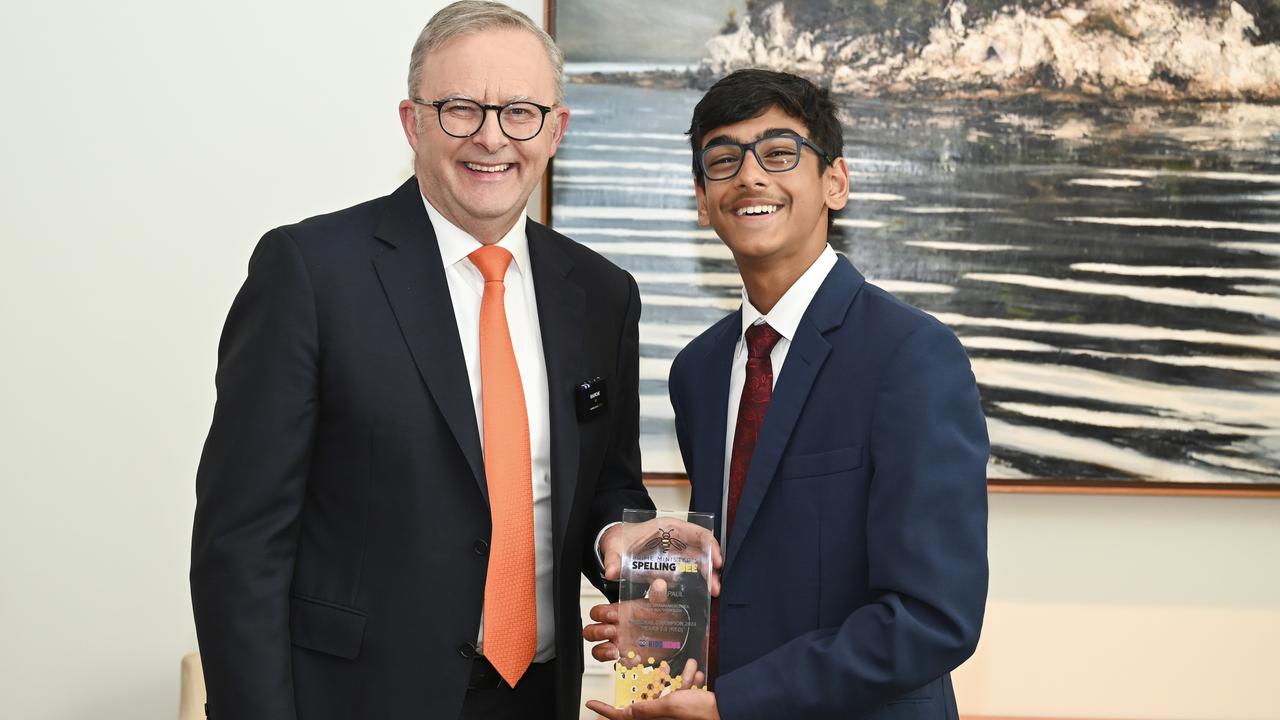
While it wasn’t Aditya’s first choice – who was going ask Mr Albanese to spell “bourgeoisie*” – the Year 7 Sydney Grammar School student took pity on the Labor leader.
“I originally was going to go with bourgeoisie … but later I decided that he’s probably had a bit of a rough day in office,” said Aditya.
“We listened in on question time and it was quite lively, so we decided to just maybe tone it down a bit.”
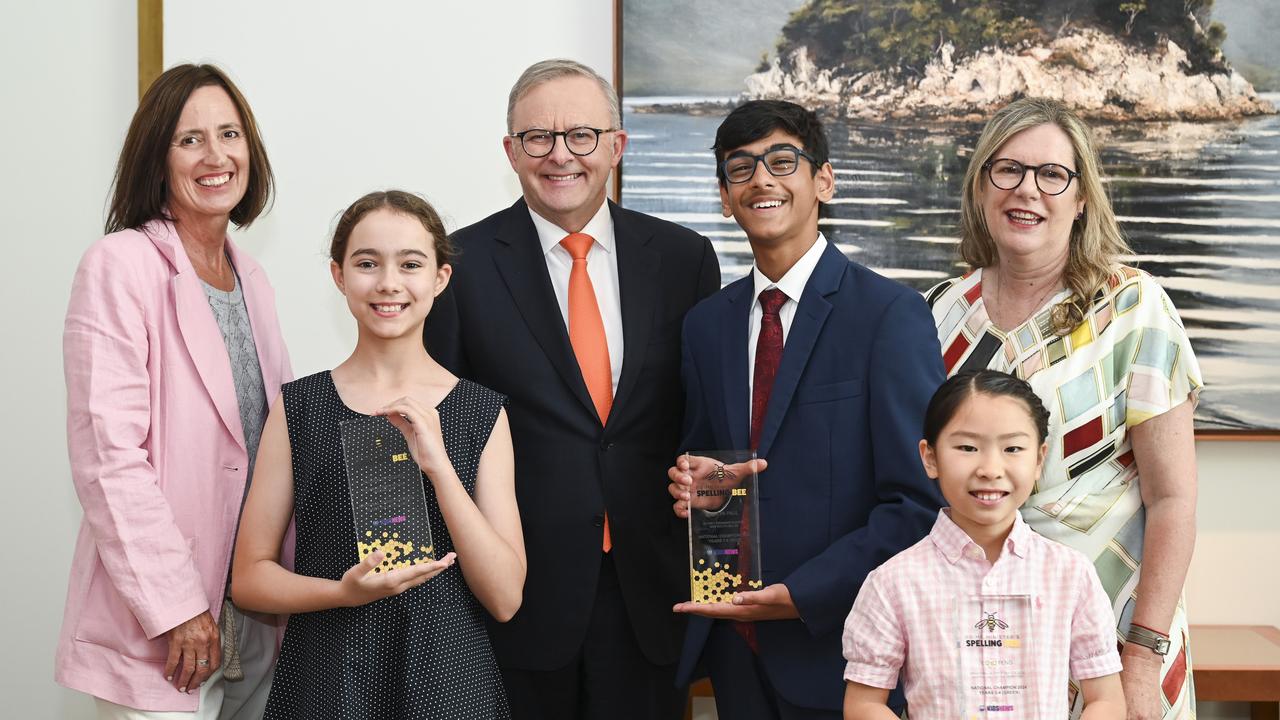
Preparation for the country’s top spelling prize is tough, with all three winners avid* readers.
Jillian, who loves the Percy Jackson and the Olympians series, said her love of spelling was because “it just sort of helps people to communicate things easily”.
Reading the dictionary and the classics helped to hone Aditya’s win, whose advice to future Spelling Bee champions was to not “cram (training) into a week or two”.
Run by Kids News and News Corp Australia, this was the fourth year of the Spelling Bee, with Mr Albanese personally crowning the winners for the third year in a row while also posing for selfies with the families.

The competition challenges young minds across three different age brackets, green (Years 3-4), orange (Years 5-6) and red (Years 7-8), with Monday’s winners coming out on top after three rounds.
News Corp Australia community ambassador* and Herald and Weekly Times chairman Penny Fowler said the annual competition played an “important role in educating our children”, which benefited all Australians.
“News and advocacy* helps create positive change across the Australian community and Kids News recognises the importance education plays and how sound literacy and a love for language can unlock a lifetime of learning,” she said.

“This year we had a record number of Australian schoolchildren enrol in the PM’s Spelling Bee – more than 70,000 students from almost 1400 schools.”
Kids News editor Diana Jenkins said the Spelling Bee had been championed by teachers from “Launceston to Alice Springs”.
“Teachers have embraced the Bee because foundation literacy skills are at the heart of a sound education,” she said.
“There is no greater priority for Kids News than supporting all young Australians by providing reliable news and literacy tools like the Bee that are so essential for their future.
“The News in the Community program ensures these resources are free to use so that every Australian child has the same access to opportunity.”
WATCH THE VIDEO
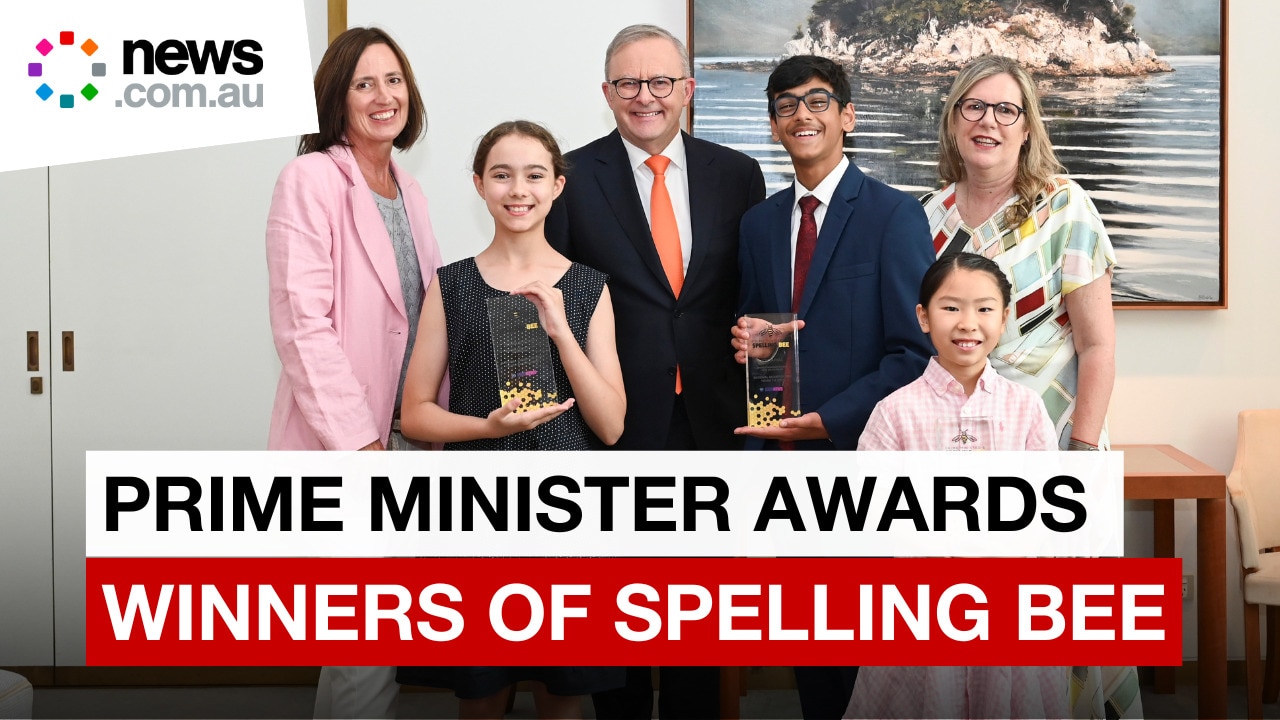
POLL
GLOSSARY
- iconic: a representative symbol
- shirked: avoided or neglected
- astrophysicist: a scientists who tries to understand the universe and its contents, including planets and stars by applying the laws of physics
- filibuster: a political move where a member of a legislative body prolongs debate on a proposed law in order to delay or prevent a decision being made
- bourgeoisie: the wealthy middle class
- avid: having a keen interest in
- ambassador: representative
- advocacy: support of a particular cause
EXTRA READING
New Spelling Bee champs crowned
Meet the Bee’s ‘perfect score kids’
Spelling Bee champ meets Queen
QUICK QUIZ
1. What difficult word did Prime Minister Anthony Albanese pass on attempting to spell?
2. Why did 13 year old Aditya Paul change his mind about asking the Prime Minister to spell “bourgeoisie”?
3. How many students enrolled in this year’s PM Spelling Bee?
4. How many years has the PM Spelling Bee been held?
5. What advice does Aditya offer for future Spelling Bee champions?
LISTEN TO THIS STORY
CLASSROOM ACTIVITIES
1. Spelling champions
Do you think being a good speller makes you a better learner, communicator and all-round student?
Write the reasons to support this argument, and the reasons that support this not necessarily being true. Use your knowledge of students you know and your own learning style to support your argument:
BEING A STRONG SPELLER MAKES YOU A BETTER COMMUNICATOR AND STUDENT
ARGUMENTS TO SUPPORT: ARGUMENTS TO REBUT:
Time: allow 15 minutes to complete this activity
Curriculum Links: English, Personal and Social, Critical and Creative Thinking
2. Extension
Use the dictionary to look up five difficult words. Work with the person closest to you, and tell them the word, the origin (where the word originates from) and the meaning and see how they go about spelling it.
–
–
–
–
–
Give them a score out of five and then you have a turn.
Time: allow 15 minutes to complete this activity
Curriculum Links: English, Personal and Social, Critical and Creative Thinking
VCOP ACTIVITY
Down-level it
When you up-level a sentence, you do things to it to improve it: make it more interesting, or more complex.
But sometimes, when we read something it can be too complex and we don’t understand it very well. You ask someone to explain it to you, they do (in a simpler way) and you think, well why didn’t they just say that?
Go through the article and find a sentence or two that is complex, or hard to read.
Ask an adult what it means, or try and look some of the words up in the glossary.
Once you know what it means, see if you can rewrite it in a simpler way- down-level it.
Make sure you don’t change the meaning of the sentence in any way though.


